Swiss food giant Nestlé is delving into plant-based foods to future-proof its portfolio. This week, the company launched two new vegan chocolate chips under its Toll House brand to meet demand for plant-based products. According to a 2021 report by market research firm Mintel, 48 percent of consumers are looking for products with a “plant-based” label, one of the biggest trends in baking.
To answer the call, the company introduced Nestle Toll House Semi-Sweet Plant-Based Morsels and Nestle Toll House Dark Chocolate Plant-Based Morsels, each available in 9-ounce bags for a manufacturer’s suggested retail price of $5.19.
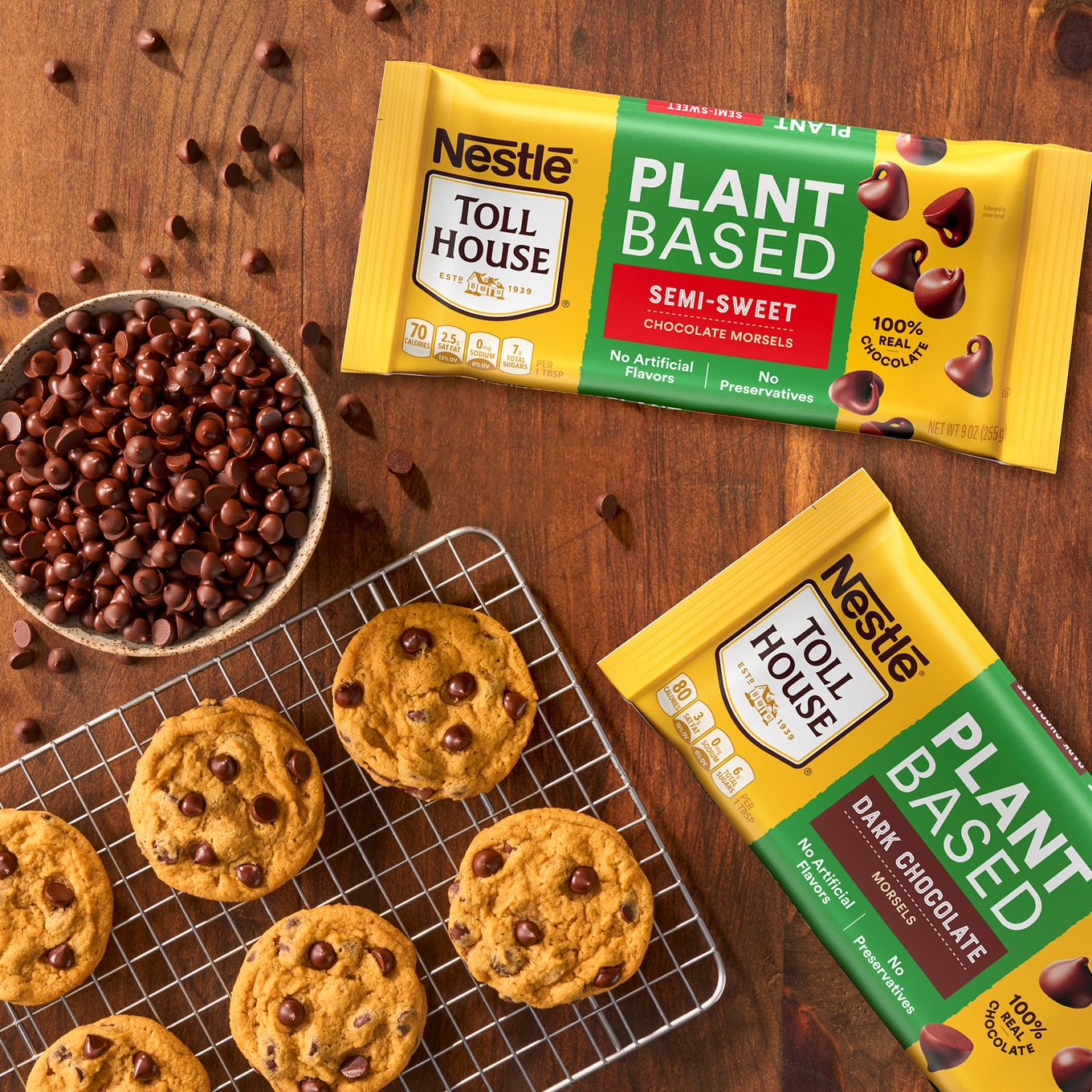 Nestlé
Nestlé
“As the founder of the chocolate chip morsel more than 80 years ago, Nestlé Toll House is committed to creating great-tasting products that meet the evolving lifestyle needs of consumers,” Chandra Kumar, president of Bakery Sweets at Nestlé USA, said in a statement sent to VegNews.
“With the introduction of our new plant-based morsels, even more people will be able to enjoy the iconic Nestle Toll House Chocolate Chip Cookie, regardless of their dietary preferences or restrictions.”
Nestlé hints at a vegan food future with new products
The launch of the new dairy-free Toll House chocolate morsels follows recent plant-based additions to Nestlé’s global portfolio.
In Europe, Nestlé operates Garden Gourmet, a brand that offers a range of plant-based products, including schnitzel, burgers, chorizo, chicken and more. In November, Nestlé launched its new product under the brand name “Foie Gras,” a vegan alternative to foie gras—traditionally made from the liver of ducks or geese that are force-fed through a tube.
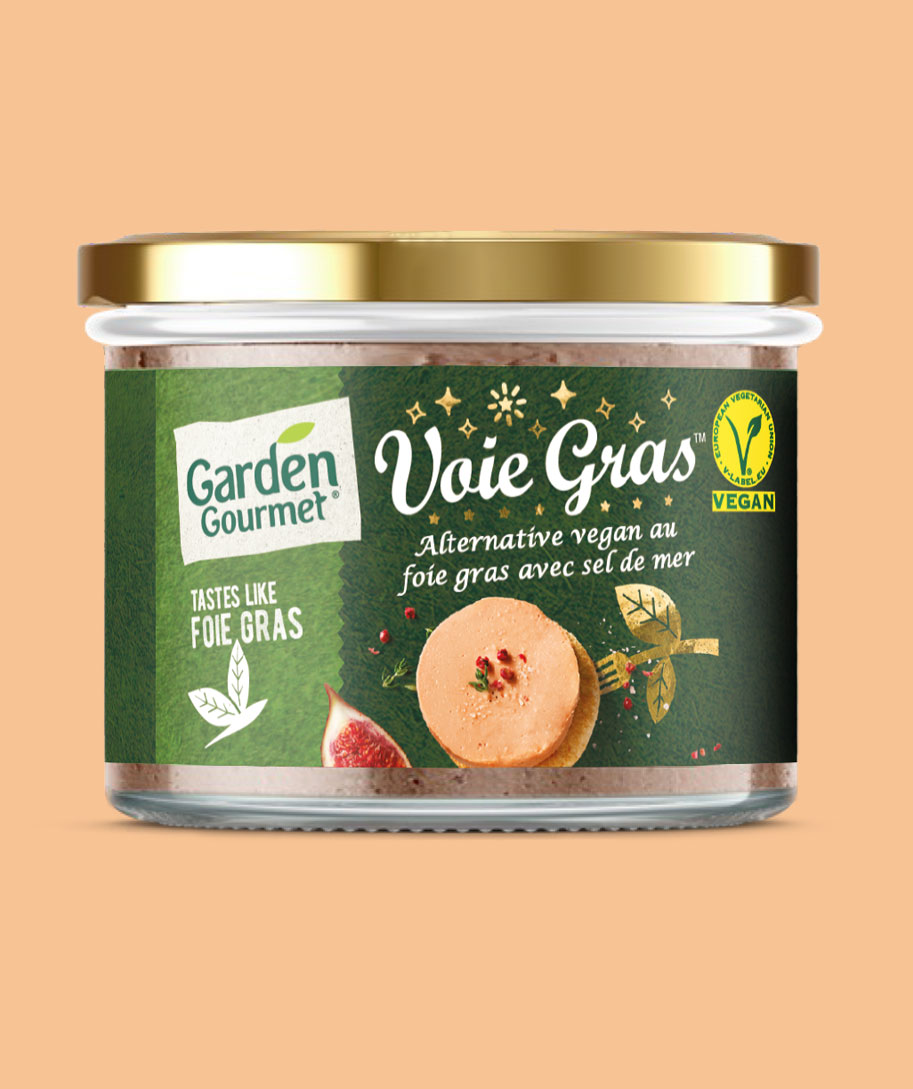
Nestle Switzerland
The new Voie Gras pâté was developed in just six months with the help of 300 plant-based food innovators at the Nestlé research center in Lausanne. Featuring a similar nutritional profile to its animal-produced counterpart, vegan foie gras is made from a blend of vegetable ingredients flavored with miso paste, sea salt, and truffle oil.
The limited-edition vegan foie gras first hit grocery chain Coop’s nearly 140 locations in Switzerland and Spain where it was offered for CHF 7.95 ($8.37 USD) per six-portion container, much cheaper than animal-derived foie gras.
While France is traditionally the top consumer and producer of foie gras, Switzerland—where production is illegal—imports an estimated 200 metric tons of the cruelly raised animal product. However, its use is declining as more consumers become aware of how foie gras is produced.
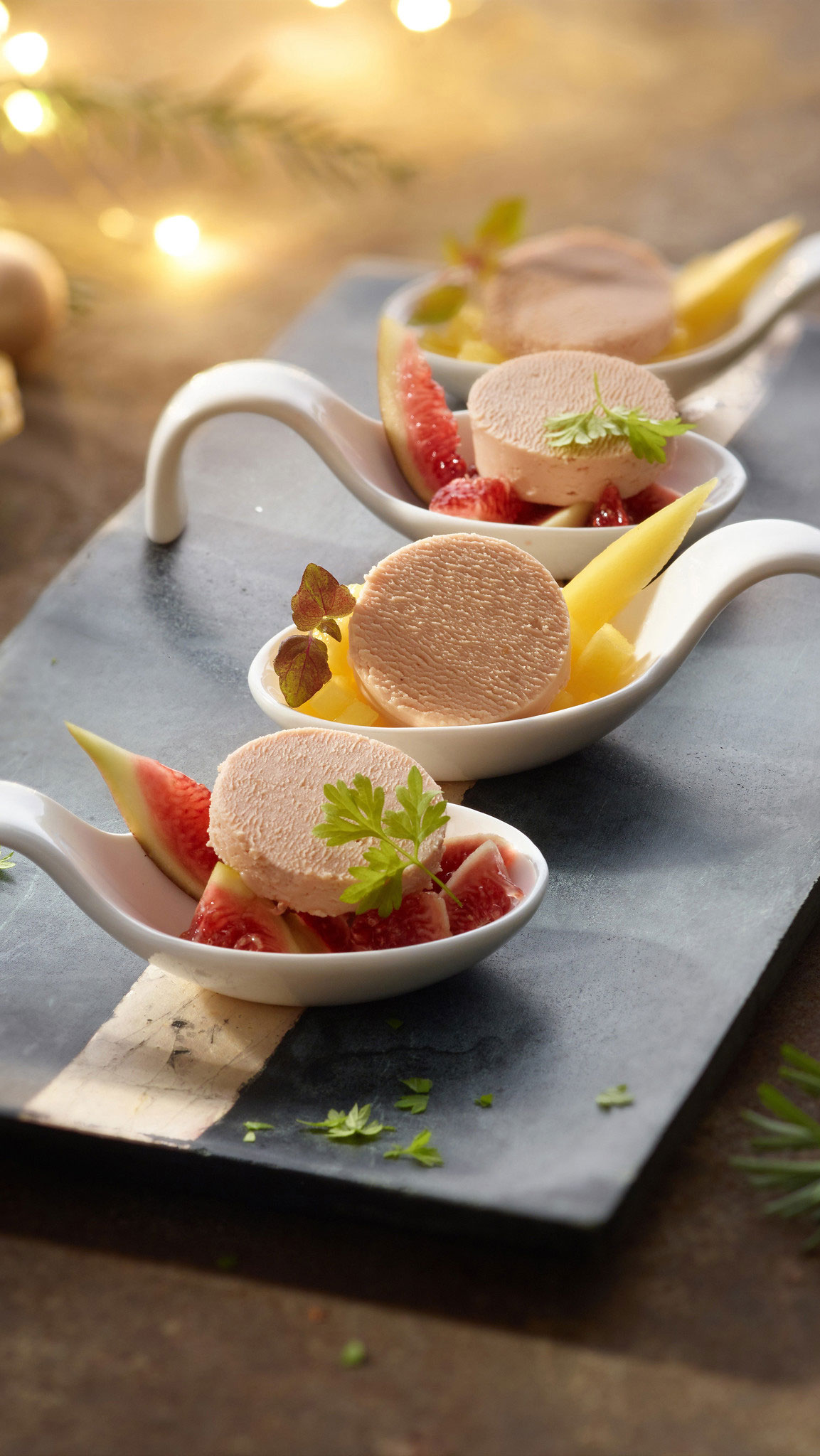
Nestle Switzerland
“We are particularly proud of this unique product, which marks the strategic expansion of Garden Gourmet’s vegetable offering and the creativity of our team,” said Melanie Stabler, Garden Gourmet’s marketing manager, in a statement. “Furthermore, we are delighted that Switzerland is one of the first two markets where this innovation has been launched.”
Coop has not sold animal-derived foie gras for two decades due to cruelty concerns and Martin Stutz, category manager for vegetarian and vegan options at Coop, is excited to welcome foie gras to its shelves.
“For animal welfare and trust, we have stopped selling foie gras for 20 years,” Stutz said in a statement. “Voie Gras offers an ideal alternative and we are delighted to be the only Swiss retailer to offer this product exclusively on our shelves during the Christmas period this year.”
Nestlé’s announcement comes at an opportune moment as European consumers may be increasingly interested in alternatives to traditionally made foie gras as King Charles III confirmed late last year that cruelly raised animal products are banned from menus at all royal residences.
Nestlé’s new vegan eggs
Nestlé is also exploring the potential of plant-based eggs. In 2021, food giant Garden Gourmet launched vEGGie, a vegetarian egg in liquid form that contains soy protein and omega-3 fatty acids.
In December, Nestlé leveraged the know-how it gained in developing the vEGGie with the pilot launch of a powdered soy-based egg under the Malhe brand in Latin America.
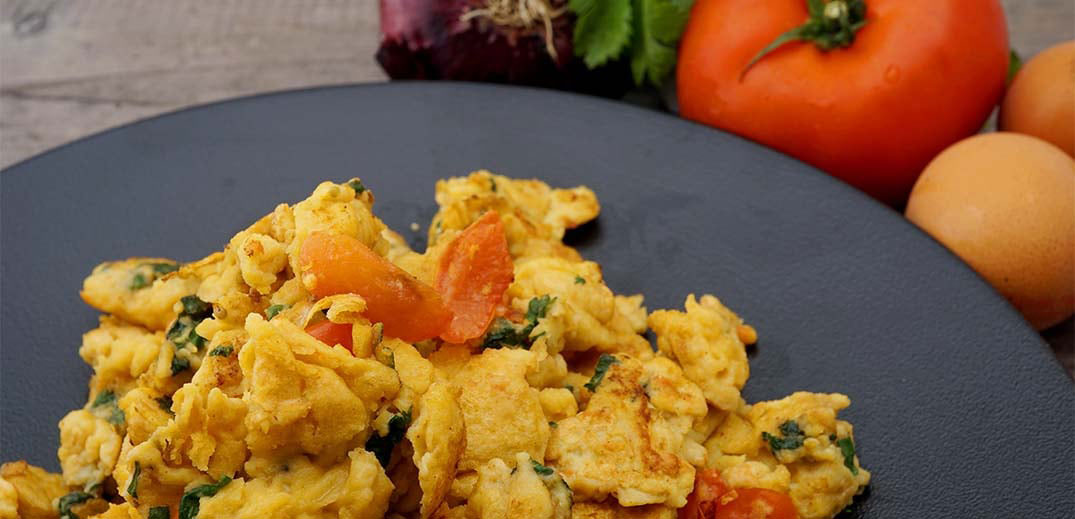
Nestlé
The shelf-stable, iron-fortified product was developed as an affordable, plant-based alternative that can be used to replace a portion of eggs in meals and reduce saturated fat and cholesterol while providing an equal amount of protein.
“Eggs are one of the most widely consumed protein sources. With this unique solution, we wanted to provide an affordable, nutritious solution that can be used to replace some eggs when cooking egg-based foods,” Torsten Pohl, Head of Nestlé’s Product and Technology Center for Food, said in a statement. “The plant-based dry blend delivers equal amounts of quality protein, low cholesterol, while ensuring a good taste and texture.”
Nestle’s is currently testing its egg alternatives in Central America with additional markets planned across Latin America.
Nestle enters vegan chocolate
In addition to the new Toll House Morsel, Nestlé has been exploring other types of vegan chocolate in recent years. After a limited test launch in 2021, Nestlé expanded the availability of its KitKat V to 15 countries across Europe last August. This vegan version made with rice milk has an 18-percent lower carbon footprint than original milk chocolate KitKat bars.
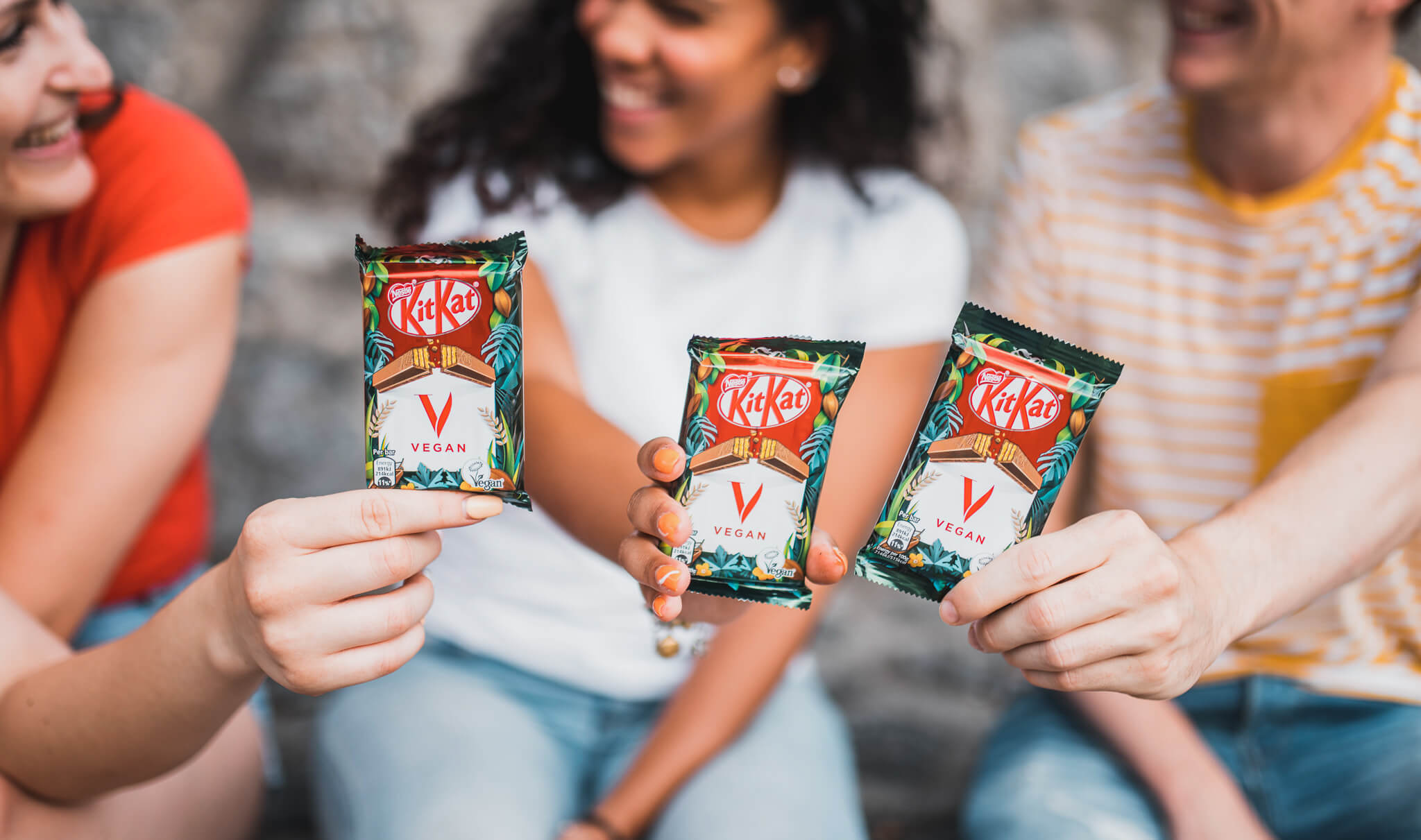
Nestlé
Beyond its new Toll House morsels, Nestlé has previously explored other vegan chocolate morsels. In 2018, the company introduced vegan chocolate chips in semi-sweet, dark chocolate and white chocolate varieties. These baking chips were positioned as an allergen-friendly alternative under the Simply Delicious line within the Toll House brand.
Last year, Nestlé also partnered with California-based company Perfect Day to explore opportunities for its animal-free ash, which is made using precision fermentation instead of exploiting cows. While the first products to be marketed here will be in the animal-free fluid milk format, the potential of this collaboration could lead to new products in other categories, including its chocolate portfolio.


